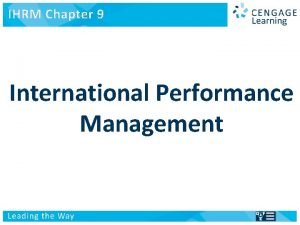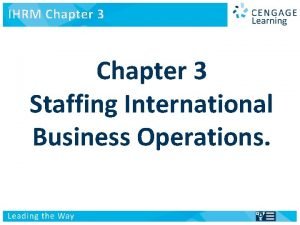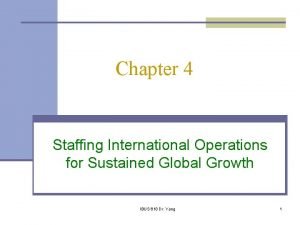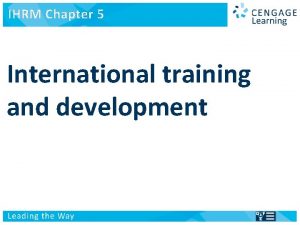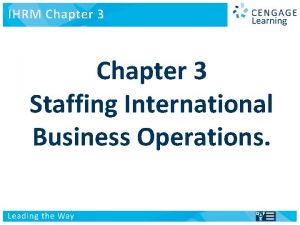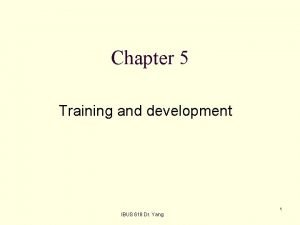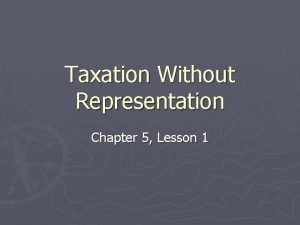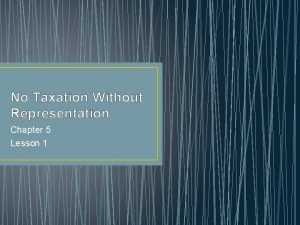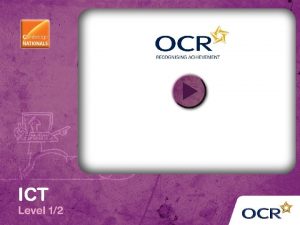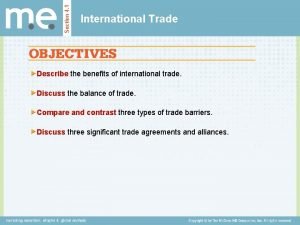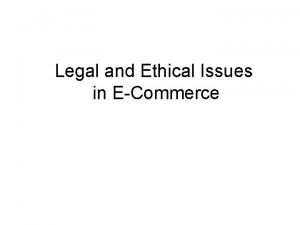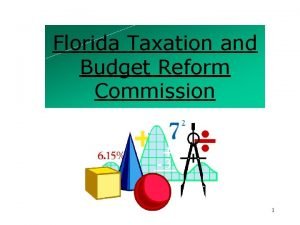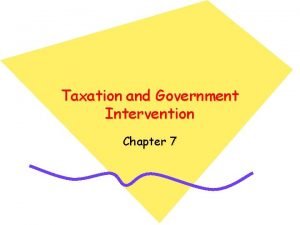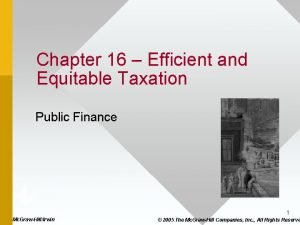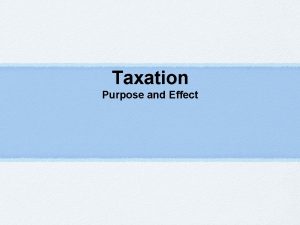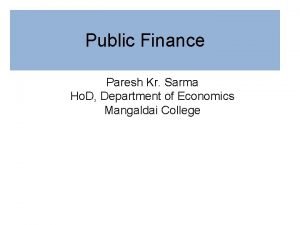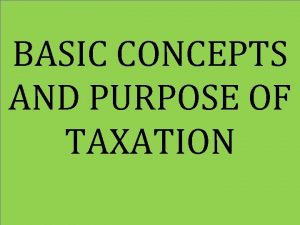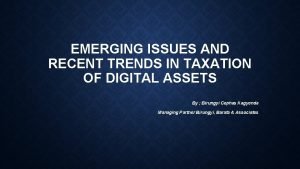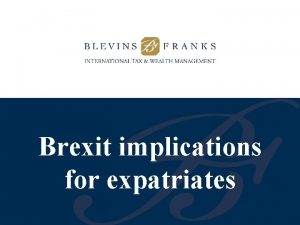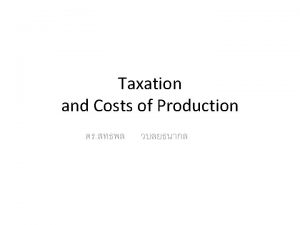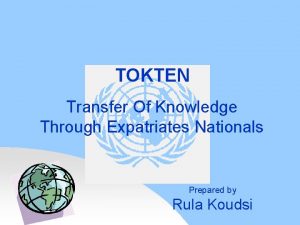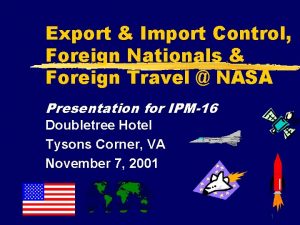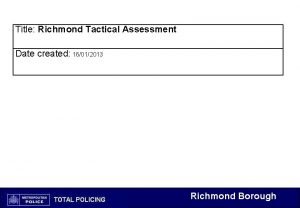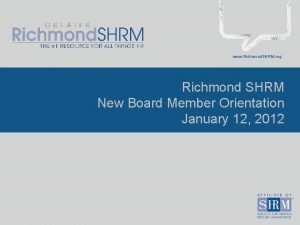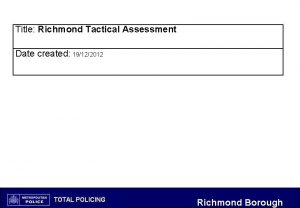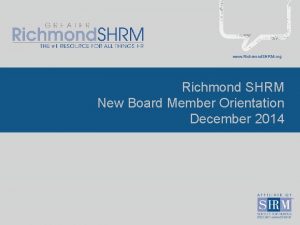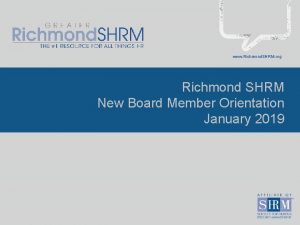Taxation Expatriates and Foreign Nationals APA Richmond Chapter



































- Slides: 35

Taxation - Expatriates and Foreign Nationals APA Richmond Chapter Meeting August 17, 2016

Your presenters ► Nathan Mathis Mobility Performance Improvement – Manager Mc. Lean, Virginia Nathan. Mathis@ey. com ► Anika Kim Global Mobility Tax – Manager Mc. Lean, Virginia Anika. Kim@ey. com Page 2 Taxation - Expatriates and Foreign nationals

Agenda ► Payroll for Mobile Employees ► ► ► Expatriates ► ► ► Mobility lifecycle Payroll best practices Who is an expatriate Foreign earned income exclusion Foreign tax credit Payroll considerations Tax equalization Foreign Nationals ► ► ► Page 3 Taxation foreign nationals Payroll considerations Social security totalization agreements Taxation - Expatriates and Foreign nationals

Payroll for mobile employees Page 4 Taxation - Expatriates and Foreign nationals

Payroll process – The mobility lifecycle Page 5 Taxation - Expatriates and Foreign nationals

Payroll best practices – Sample decision guide Move Type? Relocation Secondment Policy Type? Type 1 Host Country Payroll Page 6 Home Country Payroll Type 2 HQ or GEO Payroll Taxation - Expatriates and Foreign nationals Type 3 Split Payroll

Payroll best practices – Due diligence checklist ► ► A due diligence checklist serves as a reminder of the policy and compliance considerations related to international moves Promotes dialogue among program stakeholders (e. g. , HR, Finance, Legal, Corporate Tax) Promotes proactive planning and mitigates compliance risks Particularly useful for planning entry into a new country or location Considerations: ► Which stakeholders are represented in the checklist? ► Who is responsible for documenting decisions and outcomes? Page 7 Taxation - Expatriates and Foreign nationals

Payroll best practices – Mobility FAQ document ► ► ► Target audience may be international assignees and/or program stakeholders Payroll FAQ document typically has a permanent role that accompanies the policy documentation Additional FAQs accompany an announcement regarding change in the mobility program contacts, policy, or procedures Considerations: ► Who is tasked with updating regularly? ► What is the most effective means of distribution (e. g, e-mail, intranet site)? ► Does each policy have it’s own FAQ for payroll or can payroll considerations be covered with one? Page 8 Taxation - Expatriates and Foreign nationals

Payroll best practices – Assignee balance sheet ► ► ► Used to calculate and communicate assignment-related allowances and deductions Delivered to the assignee prior to the assignment, and at the time of any subsequent changes Delivered to payroll if no automated systems interface exists Considerations: ► Where is assignment related income delivered (home / host / HQ / split)? ► What is the appropriate currency and pay frequency for the calculations? ► How do the line items map to payroll wage types? ► Are gross-ups calculated automatically in the payroll system, or do they need to be instructed on the balance sheet? Page 9 Taxation - Expatriates and Foreign nationals

Expatriate taxation Page 10 Taxation - Expatriates and Foreign nationals

Taxing expats – Who is an expatriate? ► The individual is a US citizen or a green card holder AND ► Who has a foreign tax home ► Tax home: ► ► Page 11 Main place of business, employment, or post of duty Place where taxpayer is permanently or indefinitely engaged to work as an employee or self-employed individual Taxation - Expatriates and Foreign nationals

Taxing expats – Implications of international assignments ► ► ► Page 12 Inflated wages – who will pay the related tax? Double taxation – both in the home and host countries Complexity with payroll and tax filing obligations in the home and host country Taxation - Expatriates and Foreign nationals

Taxing expats – Foreign earned income exclusion ► For 2015, the maximum exclusion is $100, 800 per taxpayer. In addition, the taxpayer may exclude housing expenses in excess of 16% of this maximum with limits ► Foreign earned income is income you receive for services you perform in a foreign country during a period your tax home is in a foreign country ► Place of payment is immaterial Page 13 Taxation - Expatriates and Foreign nationals

Taxing expats – Bona Fide Resident (BFR) test Individual must be a US citizen and establish residency in a foreign country for an uninterrupted period that includes an entire US tax year AND ► Individual must have a foreign tax home ► For example, if taxpayer goes overseas on assignment in mid 2016, to qualify for the exclusions in 2016, he must have a tax home in a foreign country and be resident overseas for the entire tax year 2017 Page 14 Taxation - Expatriates and Foreign nationals

Taxing expats – Physical Presence Test (PPT) ► ► ► Used by US citizens and resident aliens Tax home in a foreign country Taxpayer physically present in a foreign country or countries for full 330 days during any consecutive 12 month period ► ► Page 15 330 days does not have to be consecutive Full day of foreign presence is a 24 hour period beginning at midnight Taxation - Expatriates and Foreign nationals

Taxing expats – Foreign tax credit ► What are foreign tax credits? ► ► Page 16 Income taxes that are paid or accrued to a foreign country on foreign source income. The same income must also be subject to US income tax By taking a deduction or credit, the foreign taxes reduce the US tax liability, and therefore, relieves taxpayers from a double tax burden Taxation - Expatriates and Foreign nationals

Taxing expats – Limitation of foreign tax credit ► The foreign tax credit is limited to the lesser of the foreign taxes paid or accrued in the year, or the foreign tax credit limitation. If foreign tax is higher than US tax on same income, credit is limited to US tax Page 17 Taxation - Expatriates and Foreign nationals

Taxing expats – Payroll considerations ► The worldwide wages paid by a US employer to US employees who are US citizens and residents are generally subject to federal income tax withholding and the wages are required to be reported on W-2 s. ► An exemption from federal income tax withholding applies: ► ► ► Page 18 If the employee completes, signs and returns Form 673 to the employer provided the employee qualifies for the IRC § 911 exclusion or; If the employee is a US citizen and his wages are subject to mandatory foreign tax withholding - IRC Code § 3401(a)(8)(A)(ii) or; If the employee completes new W-4 based on his/her anticipated foreign tax credit Taxation - Expatriates and Foreign nationals

Taxing expats – Payroll considerations (cont. ) ► FICA tax is due on wages of US citizens and permanent residents for services performed outside the US for an American employer or for a foreign affiliate with an IRC § 3121(l) agreement in place ► FUTA and SUTA tax is generally due on wages of US citizens (not permanent residents) for services performed outside the US for an American employer Page 19 Taxation - Expatriates and Foreign nationals

Taxing expats – Compliance challenges ► ► Shadow payroll reporting in foreign jurisdiction Capturing global wages for US wage reporting and withholding Tracking and reporting multi-year compensation for US vs. foreign purposes (timing issues) Tax reimbursement policies (e. g. tax equalization or tax protection) Page 20 Taxation - Expatriates and Foreign nationals

Tax equalization ► What is it? ► ► Page 21 Fundamental concept – to hold an employee responsible for taxes as if he or she had “stayed at home” Employee will remain neutral from a tax perspective Removes taxes from the equation when an employee is making a decision about whether to take the foreign assignment The most common method for tax reimbursement Taxation - Expatriates and Foreign nationals

Understanding Tax equalization ► ► Focus not on actual taxes but on stay-at-home tax (hypothetical tax) Companies typically pays all actual (home and host) taxes in additional to other assignment allowances Employee pays a stay-at-home tax (hypothetical tax) to the company. hypothetical tax gets withheld throughout the year as if he or she had stayed at home (similar to US federal tax withholding or pay-as-you-earn) A final reconciliation is prepared to settle the overpayment/underpayment of hypo tax withholdings at year end once the actual returns are finalized. Page 22 Taxation - Expatriates and Foreign nationals

Foreign nationals Page 23 Taxation - Expatriates and Foreign nationals

Taxing foreign nationals – Who are they? ► ► ► Definition: individual who are not US citizens Resident foreign nationals are taxed entirely differently from nonresident foreign nationals US payroll withholdings requirements often do NOT match tax compliance requirements ► ► ► Page 24 Tax based upon workdays Tax treaty positions Treas. Reg. § 31. 3401(a)(8)(A)-1(b) Taxation - Expatriates and Foreign nationals

Taxing foreign nationals – Who are they? ► Foreign nationals can file one of three types of returns in the US: ► ► Full year resident Full year nonresident Dual status (resident AND nonresident) Who is a nonresident? ► Individual who is not ► ► ► Page 25 A US citizen A lawful permanent resident (a green card holder) An individual who meets the Substantial Presence Test Taxation - Expatriates and Foreign nationals

Taxing foreign nationals – Substantial Presence Test (SPT) ► Under SPT, an individual is generally considered a resident: ► ► During any year in which (s)he is present in the US for 183 days or more. If upon ‘looking back’ to the two prior years, the individual aggregates 183 days or more using the following formula It is important to remember that under SPT, any portion of a day in the US counts as a US day. Thus if a plane lands in the US at 11: 59 pm, the entire day counts as a US day under SPT. Page 26 Taxation - Expatriates and Foreign nationals

Taxing foreign nationals – Common exceptions to SPT ► Commuters from Canada and Mexico ► ► ► If an individual regularly commutes to the US for employment from their residence in either Canada or Mexico, such an individual shall not be treated as physically present in the US on any day during which they commute Closer connection exception 7701(b)-2 There are four types of exempt individuals: ► ► Page 27 Teacher/trainee and students on F, G, J, M and Q Visas Diplomatic status/foreign government employees International organization employees Professional athletes Taxation - Expatriates and Foreign nationals

Taxing foreign nationals – What is a tax treaty? ► Purpose: ► ► ► Eliminate double taxation Residency Reduced tax rates Sourcing and exemption of income Prevent fiscal evasion Background: ► ► Page 28 First US tax treaty was in 1932 with France US has treaties with more than 60 countries Taxation - Expatriates and Foreign nationals

Taxing foreign nationals – US income tax treaty network “holes” Page 29 Taxation - Expatriates and Foreign nationals

Taxing foreign nationals – Payroll considerations Page 30 Taxation - Expatriates and Foreign nationals

Taxing foreign nationals – Payroll considerations (cont. ) Page 31 Taxation - Expatriates and Foreign nationals

Social Security totalization agreements ► ► Social Security totalization agreements eliminate dual social tax when a worker is required to pay such tax on the same earnings in more than one country. These agreements also fill gaps in benefit protection when workers have divided their careers between the US and another country. The exemption under a Totalization Agreement applies for a limited period, generally, five years. Employees must present a certificate of coverage from the foreign country to qualify for exemption from US Social Security and Medicare tax under the agreement. Page 32 Countries with Social Security totalization agreements with the US Australia France Poland Austria Germany Portugal Belgium Greece Slovak Republic Brazil (in process) Ireland South Korea Canada Italy Spain Chile Japan Sweden Czech Republic Luxembourg Switzerland Denmark Netherlands United Kingdom Finland Norway Taxation - Expatriates and Foreign nationals New in 2014

Questions? Page 33 Taxation - Expatriates and Foreign nationals

Thank you

EY | Assurance | Tax | Transactions | Advisory About EY EY is a global leader in assurance, tax, transaction and advisory services. The insights and quality services we deliver help build trust and confidence in the capital markets and in economies the world over. We develop outstanding leaders who team to deliver on our promises to all of our stakeholders. In so doing, we play a critical role in building a better working world for our people, for our clients and for our communities. EY refers to the global organization, and may refer to one or more, of the member firms of Ernst & Young Global Limited, each of which is a separate legal entity. Ernst & Young Global Limited, a UK company limited by guarantee, does not provide services to clients. For more information about our organization, please visit ey. com. Ernst & Young LLP is a client-serving member firm of Ernst & Young Global Limited operating in the US. © 2016 Ernst & Young LLP. All Rights Reserved. BSC No. 1607 -1986902 ey. com
 Transamerica estate planning foreign nationals
Transamerica estate planning foreign nationals Types of expatriates in ihrm
Types of expatriates in ihrm Role of non-expatriates in ihrm
Role of non-expatriates in ihrm Role of non-expatriates in ihrm
Role of non-expatriates in ihrm Components of ihrm
Components of ihrm Chapter 3 human resource management
Chapter 3 human resource management Practical assistance for expatriates
Practical assistance for expatriates Practical assistance for expatriates
Practical assistance for expatriates Too foreign for home
Too foreign for home Ocr cambridge nationals health and social care
Ocr cambridge nationals health and social care Cambridge national key dates
Cambridge national key dates Chapter 5 lesson 1 no taxation without representation
Chapter 5 lesson 1 no taxation without representation Chapter 5 lesson 1 no taxation without representation
Chapter 5 lesson 1 no taxation without representation Creative imedia coursework deadline
Creative imedia coursework deadline Ocr national ict
Ocr national ict Ocr sports studies ro52 example
Ocr sports studies ro52 example Cambridge nationals sports science
Cambridge nationals sports science Mini-nationals definition
Mini-nationals definition Mini-nationals definition
Mini-nationals definition Pearson higher nationals
Pearson higher nationals Ocr cambridge nationals sport science
Ocr cambridge nationals sport science Legal and ethical issues of e commerce
Legal and ethical issues of e commerce Taxation and budget reform commission
Taxation and budget reform commission Taxation and government intervention
Taxation and government intervention Efficient and equitable taxation
Efficient and equitable taxation Canons of taxation
Canons of taxation Direct and indirect tax difference
Direct and indirect tax difference Canons of taxation
Canons of taxation Classification of taxes
Classification of taxes Effect of taxation
Effect of taxation Adam smith canons of taxation
Adam smith canons of taxation Nevada department of taxation
Nevada department of taxation Business taxation syllabus
Business taxation syllabus No taxation without representation
No taxation without representation No taxation without representation
No taxation without representation Emerging issues in taxation
Emerging issues in taxation

